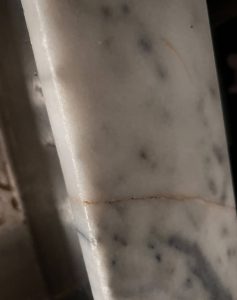Granite and marble countertops are popular choices for homeowners looking for a durable and stylish option for their kitchen or bathroom. But one common concern that many people have is whether these natural stone materials will crack over time.

The Pros of Granite and Marble Countertops
- Durability: Granite and marble are both highly durable materials that can withstand daily wear and tear. They are scratch-resistant and heat-resistant, making them an ideal choice for busy kitchens and bathrooms.
- Aesthetics: Both granite and marble offer unique and beautiful natural patterns and colors that can add a touch of luxury to any space. Plus, because they are natural materials, no two countertops will look exactly the same.
- Resale value: Homes with granite or marble countertops often have a higher resale value, making them a smart investment for homeowners who plan to sell their property in the future.
The Cons of Granite and Marble Countertops
- Cost: Granite and marble can be expensive materials, with prices ranging from $40 to $200 per square foot. This can make them cost-prohibitive for some homeowners.
- Maintenance: While granite and marble are durable, they do require some maintenance to keep them in top condition. They should be sealed regularly to prevent staining and etching, and acidic substances should be avoided to prevent damage.
- Potential for cracking: While rare, granite and marble countertops can crack under certain conditions.
What Causes Granite and Marble Countertops to Crack?
There are several factors that can contribute to the cracking of granite or marble countertops, including:
- Installation: Improper installation can cause stress on the countertop, leading to cracks over time. It’s important to hire a professional to install your granite or marble countertop to ensure it’s done correctly.
- Impact: A heavy object dropped on the countertop or a sharp blow can cause cracking or chipping.
- Thermal shock: Rapid changes in temperature, such as placing a hot pan on a cold countertop or vice versa, can cause the stone to expand and contract quickly, leading to cracking.
- Natural imperfections: Some types of granite or marble may have natural imperfections that can lead to cracking over time.
Preventing Cracks in Granite and Marble Countertops
While there is no way to guarantee that your granite or marble countertop won’t crack, there are several steps you can take to minimize the risk:
- Choose a reputable supplier: Purchase your granite or marble countertop from a reputable supplier who can provide high-quality materials and proper installation.
- Avoid impact: Be careful when handling heavy objects near your countertop and avoid placing sharp objects on the surface.
- Use trivets and hot pads: Always use a trivet or hot pad when placing hot items on your countertop to avoid thermal shock.
- Regular maintenance: Seal your countertop regularly and clean up spills promptly to prevent staining and etching.
Conclusion
While granite and marble countertops can crack under certain circumstances, they are generally durable and long-lasting materials that can add value and beauty to your home. By taking the proper precautions and maintaining your countertop, you can minimize the risk of cracking and ensure that it remains in top condition for years to come.
Tip: If you notice any cracks or chips in your granite or marble countertop, it’s important to address them promptly to prevent further damage. Contact a professional to assess the damage and determine the best course of action.
If you’re considering granite or marble countertops for your home, be sure to weigh the pros and cons carefully and consider factors such as cost, maintenance, and potential for cracking. With the right care and attention, your granite or marble countertop can be a beautiful and functional addition to your home for years to come.




